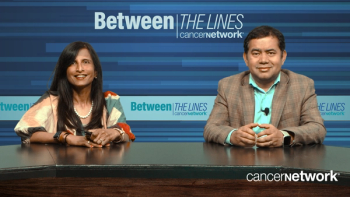
Following a review of recent data from MajesTEC-1 investigating teclistamab, the panel provides clinical insights on dosing and adverse event prophylaxis practices.

Your AI-Trained Oncology Knowledge Connection!


Following a review of recent data from MajesTEC-1 investigating teclistamab, the panel provides clinical insights on dosing and adverse event prophylaxis practices.

Experts on multiple myeloma review the study design and results from MajesTEC-1, focusing on the efficacy and safety findings, and provide insights on adverse event management practices.

Amrita Y. Krishnan, MD, and Binod Dhakal, MD, provide an overview of the current treatment landscape in relapsed/refractory multiple myeloma.
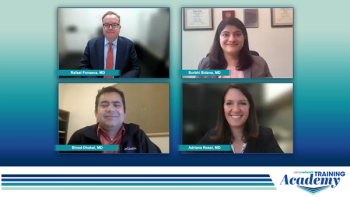
The panel concludes the discussion by offering future perspectives on the evolving treatment landscape in multiple myeloma, highlighting exciting developments and ongoing research.

Continuing discussion centered on a patient case, the panel discusses bispecific antibody combinations and the role of BCMA-targeting CAR T-cell therapies in relapsed/refractory multiple myeloma.

Adriana Rossi, MD, presents the case of a 60-year-old patient with stage III kappa light chain multiple myeloma, and members of the panel provide their initial impressions.

The panel discusses the utilization of CAR T-cell therapy for patients with multiple myeloma, highlighting treatment selection, sequencing, and insurance considerations.

Binod Dhakal, MD, presents the case of a 66-year-old patient with IgG kappa multiple myeloma, and the panel discusses treatment considerations and decisions.
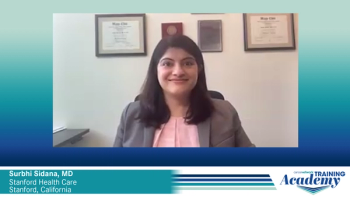
Surbhi Sidana, MD, provides clinical insights on treatment sequencing strategies for patients with relapsed/refractory multiple myeloma.

Myeloma specialists discuss clinical trials investigating CAR T-cell therapies in patients with relapsed/refractory disease.

The panel discusses recent updates on bispecific antibodies for patients with relapsed/refractory multiple myeloma, highlighting studies investigating talquetamab, teclistamab, and elranatamab.

A panel of experts on multiple myeloma introduce themselves and discuss recent CAR T-cell therapy approvals in earlier treatment lines for patients with relapsed/refractory disease.
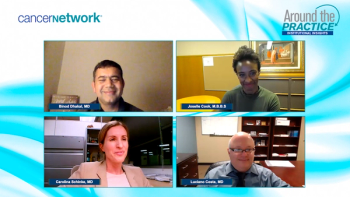
The panel closes by sharing final thoughts in the management of relapsed/refractory multiple myeloma, with a shared sense of optimism for advancements in treatment.

Key opinion leaders review the management of CAR-T therapy side effects in patients with relapsed/refractory multiple myeloma, including cytokine release syndrome and neurotoxicity, and emphasize the importance of early supervision and known toxicity timing.

Experts discuss the strategies and considerations for bridging therapy and the management of patients with relapsed/refractory multiple myeloma receiving CAR T-cell therapy.
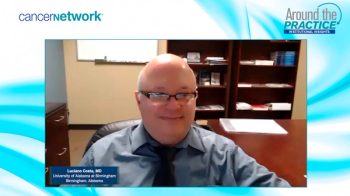
Luciano Costa, MD, discusses the effectiveness and challenges of CAR-T therapy ciltacabtagene autoleucel for patients with multiple myeloma, emphasizing the response rates and duration and the advantages in early lines of treatment.
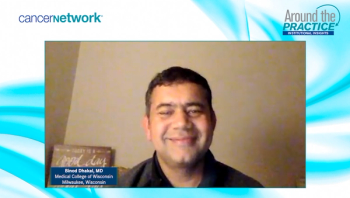
Dr Dhakal outlines the FDA-approved CAR T-cell therapy products for patients with multiple myeloma who have undergone at least four prior lines of treatment, emphasizing a focus on individualized decision-making when selecting patients for CAR-T.
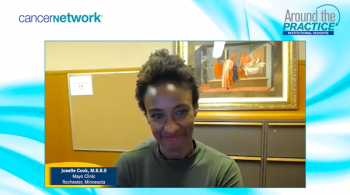
Joselle Cook, M.B.B.S., presents the case of a 62-year-old woman with high-risk multiple myeloma to the panel for discussion.
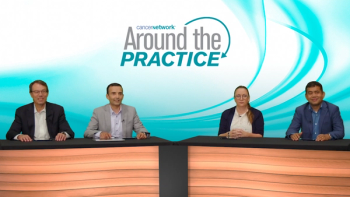
The expert panel closes the discussion with key takeaways on the relapsed/refractory multiple myeloma treatment landscape.

Multiple myeloma–treating oncologists provide comprehensive insights on deciding between bispecific antibody monotherapy, combination therapy, and CAR T-cell therapy.

Joselle Cook, M.B.B.S., explains that she believes that elderly patients with relapsed/refractory multiple myeloma can still use bispecific therapies, though more objective data on frailty is needed.

Drs Costa, Dhakal, and Cook discuss managing the unique toxicities of bispecific antibodies in patients with relapsed/refractory multiple myeloma such as infections requiring prophylaxis and supportive care, and quality-of-life complaints like taste changes and skin issues.

The panel continues their discussion on adverse effect management with a focus on GPRC5D-targeting bispecific antibodies in multiple myeloma.

Multiple myeloma specialists discuss the management of toxicities from BCMA-targeting bispecific antibodies.

Joselle Cook, M.B.B.S., and Luciano Costa, MD, note promising trials investigating combination bispecific antibody therapies for patients with relapsed/refractory multiple myeloma.

Drs Luciano Costa and Binod Dhakal discuss combining bispecific antibodies with gamma secretase inhibitors for the treatment of relapsed/refractory multiple myeloma, but trials show limited benefit and added toxicity; more promising are combinations with immunomodulators like isatuximab.

Comprehensive insights on the management of adverse effects from bispecific antibodies in the treatment of multiple myeloma.

Expert oncologists discuss dosing considerations for bispecific antibodies in the treatment of patients with multiple myeloma.

Joselle Cook, M.B.B.S., discusses the RedirecTT-1 trial combining teclistamab and talquetamab for patients with relapsed/refractory multiple myeloma, noting high response rates even in high-risk myeloma but concerns about long-term resistance.

Dr Binod Dhakal discusses response rates and toxicities seen with recently approved bispecific antibodies talquetamab in patients with heavily pretreated multiple myeloma, noting high response rates even after CAR-T, but also unique side effects.